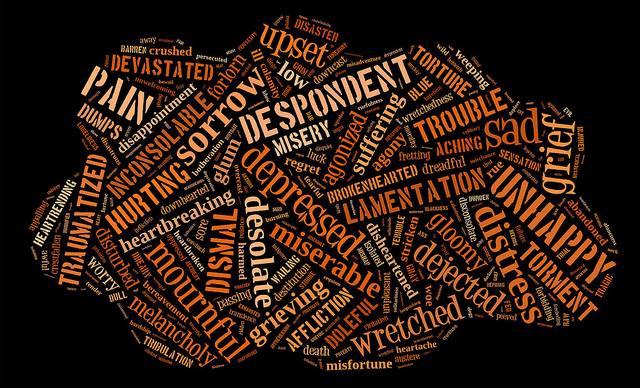“Unhappy” has become the dirty word in modern society. We are no longer allowed to utter it.
Unhappy. Why are we all so afraid to be unhappy?
If someone dares to announce that they’re unhappy we all try to avert the eyes, “Look away! Look away! Look away from the unhappy person!” This might be followed by some thoughts about how sad this person is, how they should really be seeking help and how we should distance ourselves from them in case unhappiness proves to be an airborne virus and we might, unfortunately, catch it by being in contact with said unhappy person.
Unhappiness has become the faux pas of our times. The undesirable. It’s sort of like being part of the leper community back in the day. And if it ever rears its head in our own psyche, it’s to be quickly banished and more importantly, not to be mentioned to anyone. Ever.
Think about it, we are being slammed by happiness from every corner of our virtual playing court. Happiness! Happiness! Happiness! Everyone around us is happy. As soon as you wake in the morning and check your social media accounts you’re struck by a barrage of happiness. Everyone you know—even tenuously and only by acquaintance—is out having a fantastic time at the newest restaurant, with their wonderful kids, dogs and family, traveling the world, living life to the fullest.
The happiness-nation continues, as we watch television, walk the dog, make vapid conversation with colleagues—everyone is declaring themselves to be happy.
Unhappiness is no longer du jour, it’s outdated, redundant and archaic. We live in the happiness generation, our parents lived in the unhappiness generation and that’s because they didn’t really know how to live, how to enjoy themselves. They were harnessed by self imposed obligations and negative mind sets.
We know better, we pursue happiness singularly and shove unhappiness where it should be—to the back of our sock drawer, soon to disappear altogether, to be struck from the encyclopedia of Western thought!
Is it that simple? Has good won over evil? Has happiness declared victory over unhappiness?
I don’t think that’s the case.
Recently I had coffee with a friend, and quite unexpectedly he declared,”‘I’m really quite unhappy.” I was shocked by the sudden admission. In fact I hadn’t heard the word unhappy in such a long time, it struck me as completely foreign.
“I’m not sure why, but I’m really quite unhappy,” he continued, as we sipped our chai latte’s at some hip new locale where everyone wore mustard colored pants and boat shoes.
How refreshing, I thought. In fact, I almost felt some gigantic sense of relief. A sigh, almost escaped from my lips. Finally! Here is someone who is admitting to the truth! He’s unhappy, I’m unhappy, why can’t we all just admit that there are times in our lives that we’re unhappy? Does it make us lesser the person admitting that we are? And how have we convinced ourselves that happiness is the only state of being?
In The Good Life, Australian academic, Hugh Mackay examines happiness and unhappiness and why we shouldn’t let one of these two emotions triumph over the other. He writes:
“If you encourage people to pursue happiness single-mindedly as their primary goal, either they are going to risk surrendering to the delusion that it’s possible—desirable, even—to float through life in a bubble of joy, seeing the world through a happy haze, or they’re going to be frequently disappointed and frustrated. Neither is a healthy outcome. We need to change the agenda. Let’s not crown happiness as the sovereign emotion. Let’s leave it where it belongs, as one among the many emotions that, taken together, make us who we are.”
Mackay argues that we need to experience the full spectrum of emotions to be “whole” and that the pursuit of a hedonistic notion of happiness can, in fact, lead to the opposite emotion—unhappiness.
I would argue that we are in the throes of the latter, pursuing everything that glitters to embellish our lives and portray a picture of happiness to those around us, whether it is through social media or in our daily lives. We can no longer admit to being unhappy because somehow that notion now equates to failure. If you’re unhappy you’re most definitely not #winning. Furthermore, the need to closet away our unhappiness like a personal skeleton is not helping our genuine pursuit for a more fulfilling life, in fact, it has the opposite effect.
Realistically many of us are #winning but are also #unhappy. The term has just become so unsavory we can no longer let it broach our lips.
What we’re fundamentally missing is that communication is the very essence of humanity. We need to be able to talk and connect with those around us, give advice, receive advice, sympathize, empathize and understand that we’re all in it together. We all really experience very similar things, just in different ways.
So I’m here to tell you that you’re not Robinson Crusoe in your unhappiness. You don’t need to hide your unhappiness away where no one can see it. You do not need to portray yourself as constantly happy to fall into a definition of shining, happy, productive people that has been established for us.
You are allowed to be unhappy. And you are allowed to tell those around you that you are.
Relephant Favorite:
Why We Are Unhappy & What We Can Do About It.
~
Author: Lisa Portolan
Assistant Editor: Cecilia Vinkel/Editor: Travis May
Image: “Emotions Examined” by Golly G. via flickr.







Read 0 comments and reply